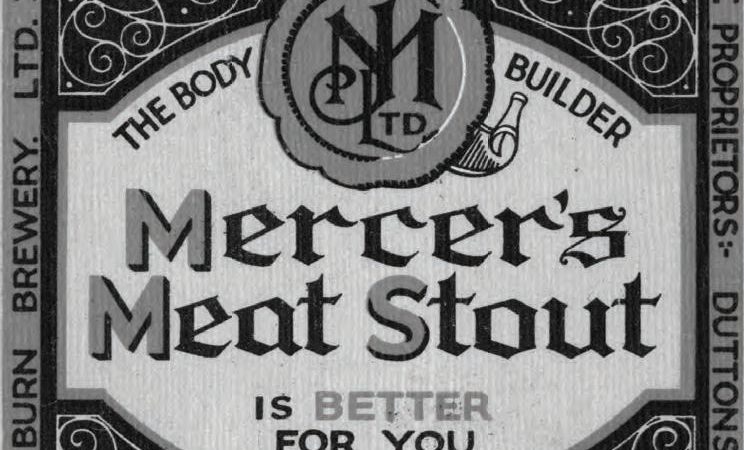GUINNESS is Good for You” once advertised the famous Dublin brewer. A Lancashire company went one step further. Dutton’s of Blackburn claimed its Mercer’s Meat Stout “is Better for You.” The bottle label boasted that MMS was “a nourishing stout… recommended for invalids. Refreshing and invigorating.” A back label backed up the message. It didn’t quite claim to be able to raise the dead, but it certainly believed it could put life into the living: “Mercer’s Meat Stout is specially brewed for purity, nutrition and health… tests amply demonstrate its unsurpassed value as a body builder and brain food.” Anyone with any doubts were invited to visit the brewery’s offices “where the analysis and numerous unsolicited testimonials are open for inspection.”
Such claims were once widespread. The Brewers’ Society’s collective advertising campaign, Beer is Best, launched in 1933 in a bid to boost sales, promoted beer “for bodily health and energy” and “a fitter Britain.” One poster had darts highlighting “Malt for digestion; hops for appetite, sugar for energy; yeast for vitality.”
Another poster from Fuller’s of Chiswick showed an athlete leaping a hurdle under the slogan “Keep fit on Beer.” Official beer provider Heineken would not have dared make such a claim at this year’s London Olympics. Yet beer was once toasted as the healthy option. The John Bull emblem of Hancock’s once lifted his glass to the words “Here’s Health!” The Oakhill Brewery of Somerset printed a booklet in 1910 asserting: “It is scarcely possible to over-estimate the value of a beverage for which it can be truthfully claimed that it is not merely a thirst quencher, a stimulant or a pleasing adjunct to the daily dietary, but is found to possess all these characteristics together with the highest recuperative powers; rendering it of the utmost value to all who are in any way debilitated, run down or in weak health from any cause whatsoever.”
It added: “This is no mere statement which cannot be justified, but the unqualified verdict of the medical profession, by whom Oakhill Invalid Stout is frequently prescribed for patients.” Even babies could benefit. The Medical Magazine was quoted saying that the stout was “particularly well adapted for nursing mothers.” Stouts had a healthy reputation in helping the sick. Some claimed amazing results. Barrett’s Brewery of Vauxhall produced a poster in 1896 showing a seriously ill woman, miraculously restored to health, holding up a bottle and announcing that Barrett’s Stout “saved my life.”
Some carried medical testimonials on their labels. Others used nurses to advertise their brews. Vaux of Sunderland promoted their stout in 1900 with a lengthy analysis from The Lancet. The Hambridge Brewery of Somerset craftily called their dark drop Graham’s Harley Street Stout – “the specialists’ drink.” They were all just what the doctor ordered, as far as the breweries were concerned. And many doctors agreed.
When Guinness decided to start advertising in 1927, its agency Benson’s asked drinkers what they thought of the stout. Again and again they were told people drank Guinness because they believed it was good for them. So the famous slogan “Guinness is Good for You” was born, followed by “Guinness for Strength.”
The Irish brewer justified these claims in its first advert in 1929 with statements that would not be allowed today. “Guinness builds strong muscles. It feeds exhausted nerves. It enriches the blood. Doctors affirm that Guinness is a valuable restorative after influenza and other weakening illnesses.
Guinness is a valuable natural aid in cases of insomnia. Guinness is one of the most nourishing beverages, richer in carbohydrates than a glass of milk. That is one reason why it is so good when people are tired.”
Not everyone approved. One member of the House of Lords complained he couldn’t go anywhere without seeing the provocative slogan. This prompted Lord Iveagh, the chairman of Guinness, to rise and make one of the shortest speeches recorded at Westminster. “Guinness IS good for you,” he said, and sat down.
In 1936, when the Federal Alcohol Administration in the United States objected to the slogan, Guinness sent a barrage of letters from doctors backing the claim and won the argument. Many GPs recommended a glass for convalescents. The brewer carefully courted the medical profession, promoting its “Good for You” line in medical and nursing publications. Bottles were supplied free to hospitals and even live yeast was sent out in waxed cartons to those who sent in doctor’s prescriptions.
In 1954 and again in 1961, the brewer wrote to every doctor in the UK asking for their experiences in the therapeutic use of Guinness and offering free samples. Around 30,000 replied. Only 82 were unfavourable. Assistant advertising manager Tony Anthony said: “The thing that struck me most about the responses was the amazing cross section of diseases and complaints for which doctors recommended a glass or two of Guinness. These ranged through the anticipated syndromes of nursing mothers, tonic and convalescence to earache, broken legs and tiredness.”
Article concludes in Issue 26 of Beers of the World Magazine

